What Flowers Pair Well with Marigolds? Best Companion Plants Explained
Are you looking to create a vibrant and healthy garden? Consider pairing marigolds with other plants for a thriving garden ecosystem. Marigolds are fantastic companion plants because they help attract beneficial insects, which can aid in pollination and pest control. Some of the best flowers to plant with marigolds include alyssum, cosmos, and zinnias.
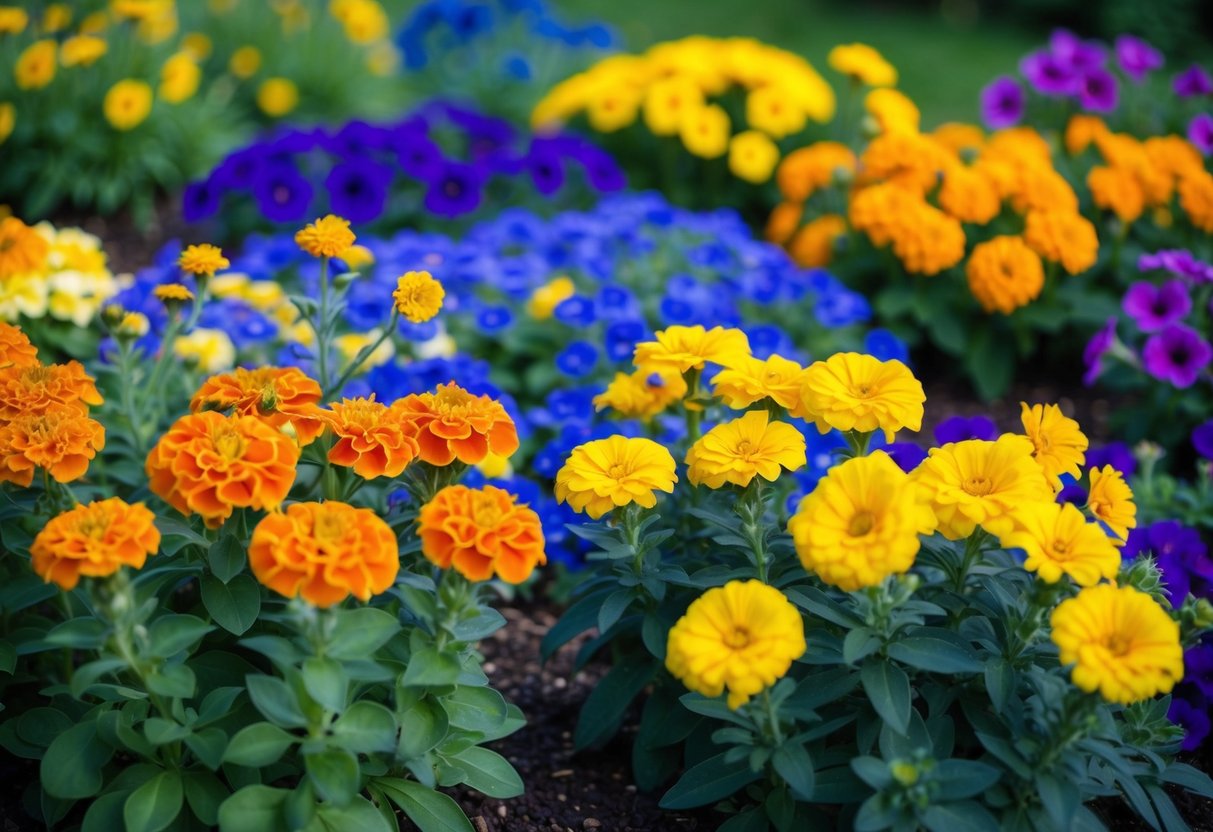
Adding marigolds alongside other flowers not only enhances the beauty of your garden but also improves its functionality. For instance, flowers from the allium family, like garlic chives, make great visual companions when planted near marigolds due to their contrasting colors. Marigolds also support a healthier garden environment by helping to deter pests.
When you plant marigolds with other flowers, you create a dynamic space that supports pollinators and protects the garden. Pairing them with flowers such as hydrangeas or roses ensures they all get full sun and well-draining soil, allowing each plant to flourish. This way, you can enjoy a garden that is not only beautiful but also buzzing with life.
Benefits of Companion Planting with Marigolds
When you plant marigolds in your garden, you gain several advantages. These flowers help in controlling pests, enhancing biodiversity, and improving soil conditions which can make your garden healthier and more productive.
Pest Control and Nematode Repellence
Marigolds are excellent at keeping pests away. They release a substance that deters soil-dwelling nematodes, which can harm your plants. Additionally, marigolds act as a trap crop for other garden pests. This means that pests are drawn to the marigolds instead of the companion plants you want to protect.
By integrating marigolds with your crops like tomatoes, you can significantly reduce problems with nematodes. This is a natural way to protect your plants without using harmful chemicals.
Enhancing Garden Biodiversity
Having a diverse garden is important, and marigolds play a key role in this. They attract beneficial insects such as ladybugs and lacewings, which help in managing the pest population. Marigolds also attract pollinators like bees, which are crucial for healthy plant growth and reproduction.
Planting marigolds with Brussels sprouts can boost the diversity in your garden. These flowers support the ecosystem by bringing in creatures that are good for your garden’s health.
Improving Soil Conditions
Marigolds can also improve soil conditions, making it better for companion plants. They thrive in well-draining soil and aid in enhancing the soil quality. Marigolds can increase soil nutrients by attracting beneficial microorganisms that break down organic matter.
This, in turn, provides essential nutrients for your other plants. When you plant marigolds alongside crops like carrots, it can lead to sweeter and more delicious harvests due to increased carotenoid content and sugars. All of this happens while naturally supporting soil health and fertility.
Best Flower Companions for Marigolds
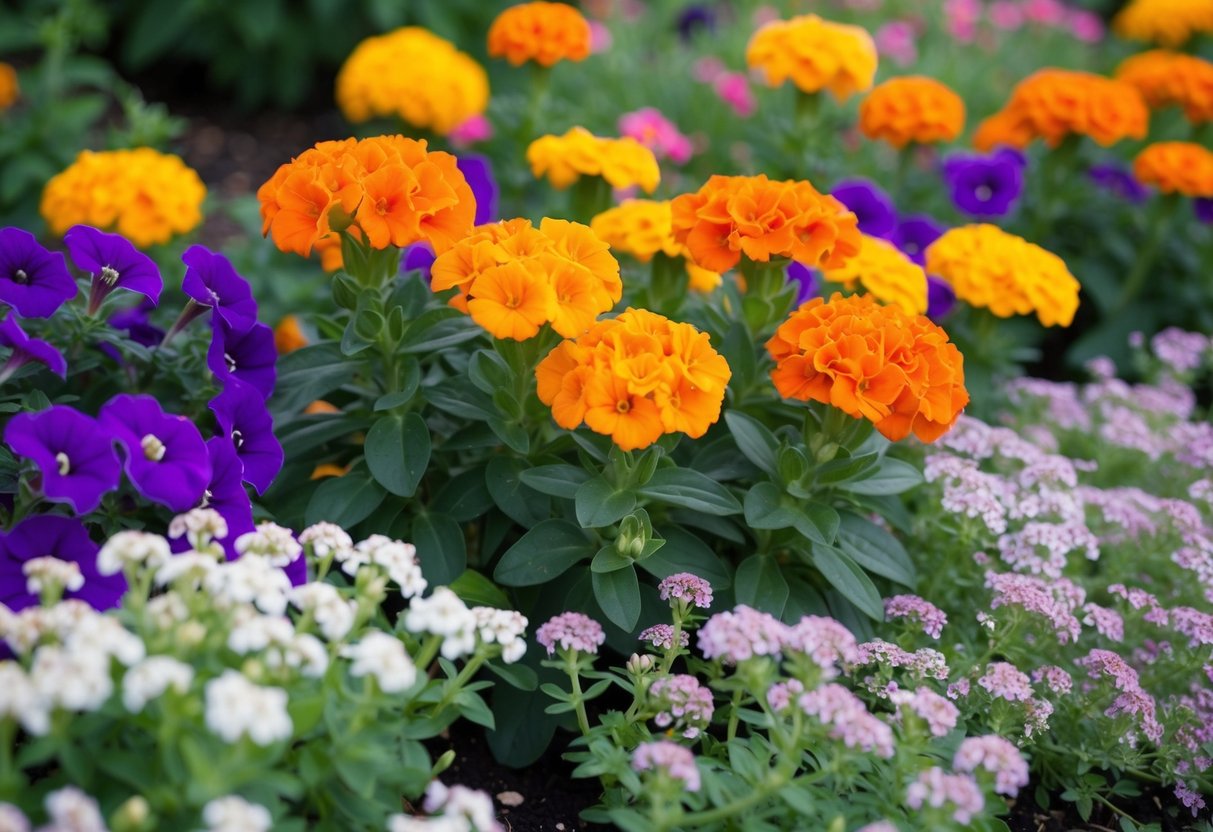
Pairing marigolds with other flowers can enhance your garden’s beauty and functionality. Together, they deter pests and attract pollinators. Consider these pairings with marigold varieties like French and African marigolds for vibrant, healthy gardens.
Asters and Bachelor’s Buttons
Asters bring lovely, star-shaped blooms that complement marigolds beautifully. They both thrive in full sun and add to the garden’s colorful display. Asters can help attract pollinators, bringing bees and butterflies to your garden.
Pairing them with Bachelor’s Buttons offers a contrasting blue hue that stands out against marigold yellows and oranges. These flowers require similar growing conditions, making them easy to cultivate together. Easy cultivation makes them a perfect match for a lively and colorful space.
Salvia and Zinnias
Salvia works well with marigolds due to its tall spikes and lush blooms. They share a love for sunny spots, making them perfect companions. This combination creates an eye-catching contrast of forms and colors in your garden.
Zinnias, with their bold and varied colors, also pair nicely with marigolds. They thrive in full sun, just like marigolds, making them ideal companions. When planted together, they create stunning displays that captivate while attracting important pollinators like bees.
Nasturtium and Alyssum
Nasturtium serves as a vibrant ground cover that matches well with marigolds. Its trailing habit and bright flowers provide a delightful mix with marigolds. Both plants can deter pests, benefiting your garden’s health.
Alyssum, especially sweet alyssum, makes an excellent low-growing partner for marigolds. It provides charming white blooms and a sweet fragrance. Alyssum adds another layer of beauty and practicality, offering ground cover to prevent weeds.
Ideal Herbs to Grow with Marigolds
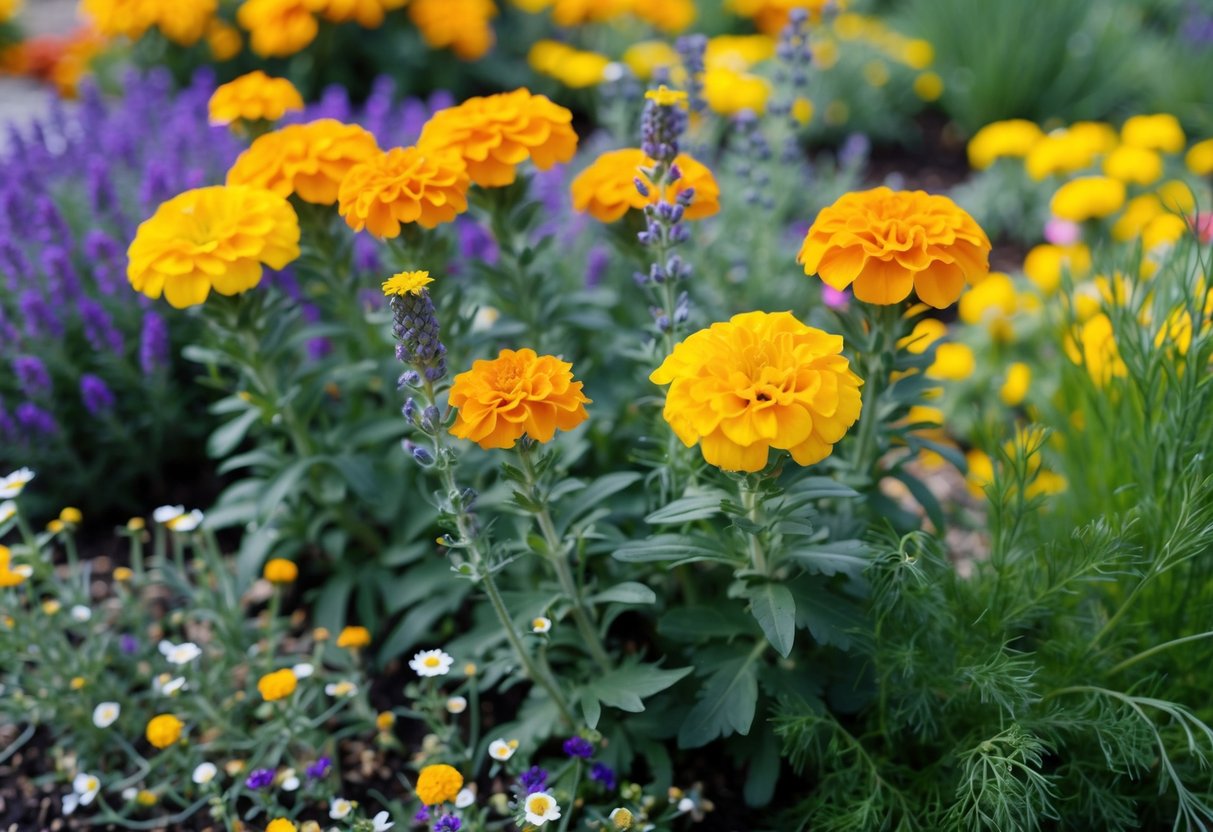
Growing certain herbs with marigolds can create a productive and healthy garden environment. Marigolds can benefit from having companion herbs around them, like basil, cilantro, rosemary, thyme, chives, and garlic. Each of these herbs helps with pest control or adds nutrients to the soil.
Culinary Herbs: Basil and Cilantro
Basil makes a great pairing with marigolds. It helps repel pests like aphids and attracts beneficial insects, improving the health of your garden. Plant basil close to your marigolds to take full advantage of these benefits.
Cilantro is another excellent companion. It’s easy to grow from seeds and thrives in the same soil as marigolds. Cilantro can help improve the soil, and both plants will flourish together. Plus, you can use cilantro in a variety of dishes, making it a practical choice too.
Aromatic Herbs: Rosemary and Thyme
Rosemary’s strong fragrance acts as a natural pest deterrent. It keeps bugs away from your marigolds and other plants in the garden. Plant rosemary in a sunny location for best results. This aromatic herb adds a delightful scent to your garden and can be used in many recipes.
Thyme, particularly creeping thyme, grows well with marigolds. Both plants protect against root-boring worms, making them excellent companion plants. Its low growth helps suppress weeds, ensuring your marigolds are not crowded out. In addition, thyme attracts beneficial insects, adding another layer of protection to your garden.
Allium Herbs: Chives and Garlic
Chives are easy to grow and help repel pests with their strong smell. When planted with marigolds, they can improve overall plant health by warding off harmful insects. You can also use chives in your cooking for extra flavor.
Garlic is an allium known for its pest-repellent properties. It helps deter bugs from your marigolds and enhances the soil with its natural chemicals. Planting garlic alongside marigolds can yield a more robust and pest-resistant garden. Use garlic in your favorite recipes while benefiting your plants, ensuring a healthy and productive garden space.
Companion Vegetables for Marigolds
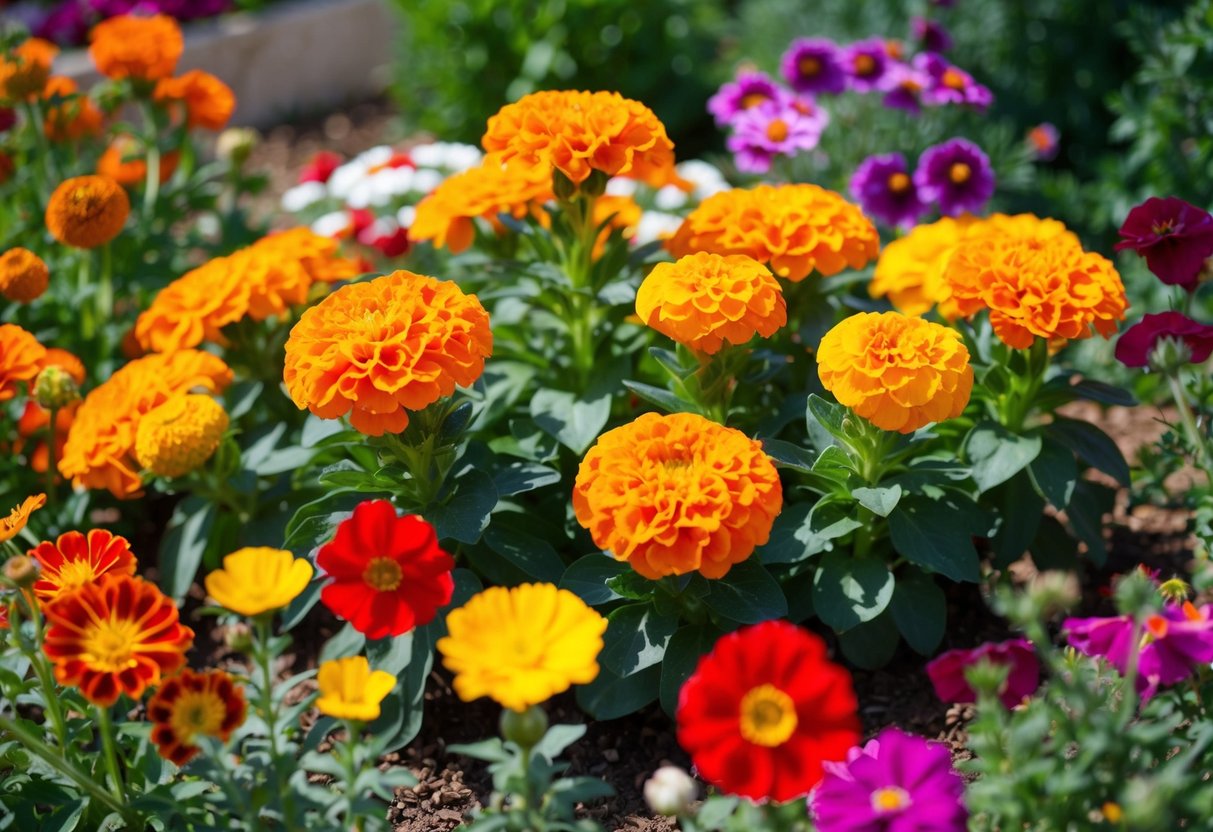
Marigolds make excellent companions for a variety of vegetables. They can enhance growth, repel pests, and even improve the flavor of some veggie garden favorites.
Nightshades: Tomatoes and Peppers
Tomatoes and peppers thrive alongside marigolds because these flowers help deter common pests like nematodes and tomato worms. By planting marigolds nearby, you create a protective barrier for your nightshade plants. This combination helps keep your vegetable plants healthy without needing chemical insecticides.
Tomatoes benefit from marigolds as they both enjoy full sun and well-draining soil. Meanwhile, the bright marigold blooms can also attract beneficial insects that will help pollinate your pepper plants. Consider planting these companions in a sunny spot for a thriving veggie garden.
Root Vegetables: Carrots and Onions
Marigolds work wonders when planted with carrots and onions. These root vegetables gain protection from pests such as carrot rust flies and onion maggots thanks to the strong scents of marigolds. This makes your harvest more robust and healthier.
For carrots, marigolds can even help enhance their flavor. Place them close together but give each plant enough space to spread its roots. Onions and marigolds also share similar soil and sunlight requirements, making them great garden companions.
Leafy Greens: Lettuce and Spinach
Lettuce and spinach thrive near marigolds, which helps keep harmful pests away. The bright flowers act as natural repellents, ensuring your leafy greens grow without being troubled by unwanted insects. Plus, their green leaves contrast beautifully with the vibrant marigold colors.
It’s a smart choice to plant lettuce and spinach with marigolds early in the season. As marigolds grow, they provide a bit of shade that can benefit these greens during hotter months. This pairing also helps maximize space in your vegetable garden by utilizing different plant heights and growth habits.
Maintaining Healthy Marigolds and Companions
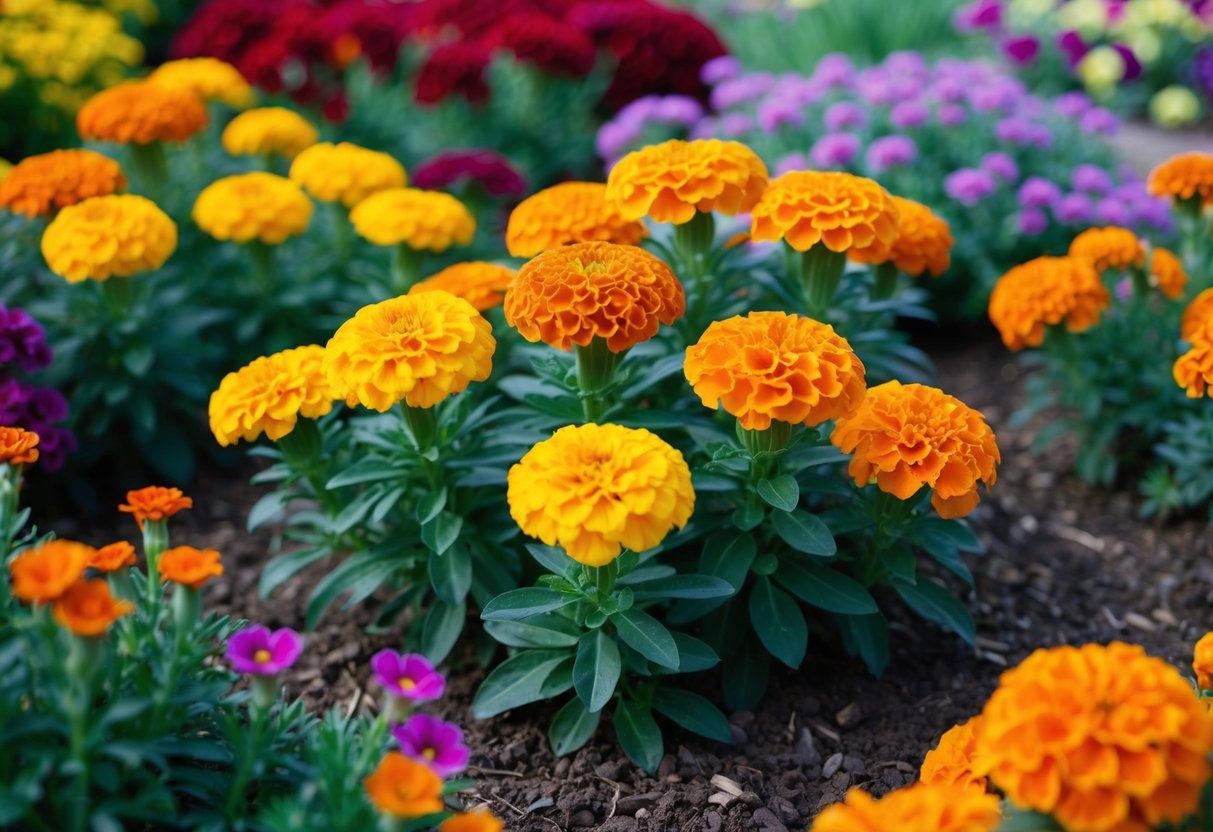
To keep your marigolds and their companion plants thriving, pay attention to their specific needs. Marigolds, including French and African varieties, have specific water and sunlight requirements. Matching these needs with those of their companion plants ensures a healthy garden. Proper soil conditions and spacing are also crucial for healthy growth.
Water Needs and Sun Exposure
Marigolds thrive in full sun, needing at least six to eight hours of direct sunlight daily. This applies to both French and African marigolds. For water needs, marigolds require regular watering, especially in hot and dry conditions, but be careful not to overwater, as they prefer soil that dries out between watering.
Encourage healthy growth by pairing marigolds with other plants that also like similar conditions. Good companions include tomatoes and thyme. These plants not only share sunlight preferences but work together to keep soil pests away. Remember, consistent watering without waterlogging keeps marigold roots healthy.
Soil Requirements and Fertilization
Marigolds prefer well-draining soil. Sandy or loamy soils work well for these annuals. Good drainage prevents root rot and other problems. When preparing the soil, mix in some compost to improve its richness and help retain moisture without becoming too soggy.
Fertilization needs for marigolds are minimal. A light feeding with a balanced, all-purpose fertilizer every four to six weeks during their growing season is usually enough. If you’re planting marigolds with vegetables like carrots, consider using an organic fertilizer to avoid chemical residue. Marigolds and their companions benefit most from soil improvements that don’t rely heavily on chemical inputs.
Growth Habit and Spacing
Understanding the growth habit of marigolds helps maintain a well-organized garden. French marigolds typically grow shorter, around 6 to 12 inches tall, while African marigolds can reach up to 36 inches. Both need adequate space for air circulation to prevent disease.
When companion planting, give each plant enough room. For instance, when interplanting marigolds with tomatoes, leave about 18 to 24 inches between the plants. This spacing helps each plant grow well and prevents overcrowding. Maintaining suitable space allows beneficial insects to move freely and keeps your garden healthy.







